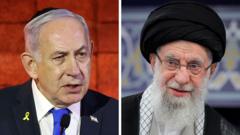Israel's recent military offensive against Iran represents a significant escalation, utilizing strategies reminiscent of past conflicts to target both missile capabilities and top-tier leaders within Iran's military establishment.
Israel's Unprecedented Military Assault on Iran: The Strategic Reasons Behind It

Israel's Unprecedented Military Assault on Iran: The Strategic Reasons Behind It
In a bold move, Israel intensifies its military operations against Iran, aiming for a decisive blow to its leadership.
Israel's latest attacks on Iran go beyond previous military actions, marking a strategic shift that mirrors its approach during engagements with Hezbollah in Lebanon. The current campaign not only focuses on dismantling Iran's missile bases to thwart potential retaliations but also aims at eliminating key figures in its leadership, similar to the decapitation strategy that severely weakened Hezbollah last year.
Current footage from Tehran reveals specific targets similar to those from operations in southern Beirut, where the elimination of influential figures had devastating effects. While prominent figures like Supreme Leader Ali Khamenei remain untouched, the Israeli strikes have reportedly resulted in the deaths of significant military leaders, including the chief of staff, Hossein Salami, and several nuclear scientists.
Israeli Prime Minister Benjamin Netanyahu hinted that these operations could extend over several days, suggesting a strategic intent to escalate the conflict significantly. He underscored that this action is rooted in Israel's survival, citing new intelligence indicating Iranian capabilities to produce nuclear weapons with alarming rapidity.
However, the timing of this offensive appears to align with the impending resumption of US-Iran negotiations regarding Tehran's nuclear program. Israeli officials may perceive this as a critical juncture to disrupt potential agreements that Netanyahu deems unacceptable. Analysts speculate that Israel's military assessment indicates that both Iran and its regional proxies, particularly Hezbollah, are currently vulnerable, prompting this assertive action.
The subsequent reactions from Iran and the ongoing developments will be crucial in determining whether Israel's calculations were astute or indicative of a strategic error.
Current footage from Tehran reveals specific targets similar to those from operations in southern Beirut, where the elimination of influential figures had devastating effects. While prominent figures like Supreme Leader Ali Khamenei remain untouched, the Israeli strikes have reportedly resulted in the deaths of significant military leaders, including the chief of staff, Hossein Salami, and several nuclear scientists.
Israeli Prime Minister Benjamin Netanyahu hinted that these operations could extend over several days, suggesting a strategic intent to escalate the conflict significantly. He underscored that this action is rooted in Israel's survival, citing new intelligence indicating Iranian capabilities to produce nuclear weapons with alarming rapidity.
However, the timing of this offensive appears to align with the impending resumption of US-Iran negotiations regarding Tehran's nuclear program. Israeli officials may perceive this as a critical juncture to disrupt potential agreements that Netanyahu deems unacceptable. Analysts speculate that Israel's military assessment indicates that both Iran and its regional proxies, particularly Hezbollah, are currently vulnerable, prompting this assertive action.
The subsequent reactions from Iran and the ongoing developments will be crucial in determining whether Israel's calculations were astute or indicative of a strategic error.






















